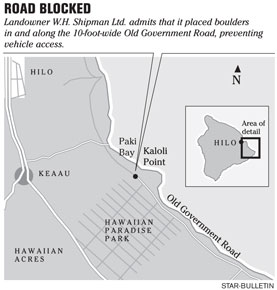Anti-car boulders might be illegal, county reports
HILO » Major landowner W. H. Shipman Ltd. acknowledges it placed boulders across a historic public roadway along the Puna Coast south of Hilo, preventing vehicle access.
 But Shipman President William Walters contends the 10-foot-wide Old Government Road is not blocked because people can still walk around the boulders. The road provides access to an informal but popular family recreation area at Paki Bay.
But Shipman President William Walters contends the 10-foot-wide Old Government Road is not blocked because people can still walk around the boulders. The road provides access to an informal but popular family recreation area at Paki Bay.
An interdepartmental e-mail by Hawaii County attorney Ivan Torigoe suggests Shipman might have broken the law. Torigoe cited several laws, including one that says it is a misdemeanor if a person "knowingly or recklessly obstructs any highway or public passage alone or with others."
County Planning Director Chris Yuen said, "Somebody is going to tell them, 'You can't do this,' but it has to be the right party."
The state might provide guidance, but it hasn't, despite county requests.
The state's Na Ala Hele trails program had posted a sign on the old road, giving the appearance that the state has jurisdiction. But Na Ala Hele has not answered Hawaii County concerning who owns the road.
Shipman, which owns more than 17,000 acres in the area, placed the boulders on June 6 at its boundary with Hawaiian Paradise Park subdivision, where the road widens to 50 feet.
Walters is clear about why he took action. It was in response to complaints about trash, abandoned cars, wild parties, gunshots and drug use spilling off the road onto Shipman property, he said.
Walters is less clear about the legal basis for the action. He told the Star-Bulletin that Na Ala Hele should answer the legal question. A Na Ala Hele statement said it is discussing "pertinent management actions."
In 1999, Hawaiian cultural researcher Kepa Maly wrote a lengthy report on the road for Na Ala Hele.
The road already existed in 1881 when William Herbert Shipman and partners bought 70,000 acres from the estate of King Lunalilo. Few people lived there, Maly discovered.
In 1930, the Shipman company asked the territorial Land Court to fix the boundaries of the company's property. The court eventually recognized the 10-foot road but not trails from the road to the shore.
In 1932, county engineer E.L. Wung wrote, "My attention has been called time and again about the public being barred from fishing and gathering opihis along the Keaau coast, as well as all fishermen after landing on the beach from canoes and sampans."
In the 1960s, developer David Watumull bought part of Shipman's land and created Hawaiian Paradise Park. The shoreline was rocky cliff. The only flat shore was at Paki Bay, a mile into Shipman land via the old road.
Randy Parker, a musician and radio disc jockey, was one of the people who lives near the road but opposed closing it.
His family camps at Paki Bay a lot, he said. "We've been going down since 1988. I feed my family by fishing there. My three sons learned how to fish, dive, throw net," he said.
Shipman closed the road too quickly without speaking to the public, he said.

